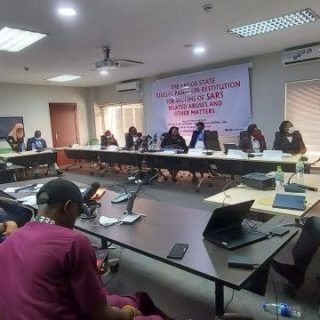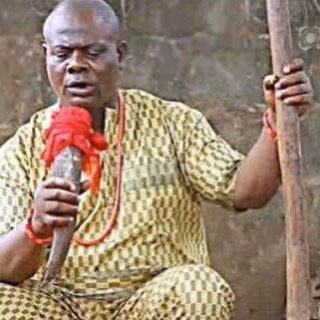To impeach a president is to charge the president with a crime or misconduct. It is after being found guilty that the president can then be removed from office.
An impeachment process is a very serious process. It amounts to reversing the decision of the people at the elections. This is why not less than two-thirds majority need of elected senators and representatives all need to agree to the removal of the president before he can be removed from office.
The process of charging the president with allegation of gross misconduct is the impeachment itself, after which a removal can happen when the president is found guilty and lawmakers agree to adopt the report against him.
Nigeria’s constitution recognises the process of removal of the president from office on account of “gross misconduct”.
Section 143 of Nigeria’s 1999 constitution explains how Nigeria’s president or vice-president can be removed from office on account of misconduct.
Is Anyone Talking About The Criminality of Imo State’s Criminal Law?
We’ve broken the process into 10 steps:
Step 1: The notice of allegation
A notice of allegation in writing must be signed by not less than one-third of all the members of the national assembly, i.e. one-third of the combined 360 members of the house of representatives and 109 members of the senate, making a total of not less than 157 signatures.The notice of allegation must be presented to the senate president.
Step 2: What must the notice of allegation say?
The notice of allegation must state that the holder of the office of president is guilty of “gross misconduct” in the performance of his official functions, including the particular things he did wrong.
What is gross misconduct, anyway?
The constitution defines a “gross misconduct” as a grave violation or breach of the provisions of the constitution or misconduct that appears to be gross misconduct in the eyes of the national assembly.
Step 3: Allegation is sent to the president and all members of the National assembly
The senate president must, within seven (7) days, deliver a copy of the written allegation to the president and to every member of the national assembly.
Step 4: The president gets to respond:
The senate president must also deliver any statement by the president in response to the allegation to every member of the national assembly, if he has any.
Step 5: Moving the motion to investigate the allegation
Within fourteen (14) days of the notice of the allegation, each house of the national assembly, i.e. senate and house of representatives must decide by a motion, without any debate, whether or not the allegation must be investigated.
The motion must be supported by not less than two-thirds of the members of each of the senate and the house of representatives, i.e. 73 members of the senate and 240 members of the house of representatives.
Step 6: What if the motion is not supported by the required number of members?
If the motion is not supported by this number then the impeachment process ends immediately. If it does, then it moves to the next stage.
Step 7: Appointing the investigation panel
Within seven days of the passage of this motion, the Chief Justice of Nigeria, must, at the request of the senate president, appoint a panel of seven people who in his opinion are of unquestionable integrity.
These seven people must not hold any public office, belong to any legislative house or any political party, and they are to investigate the allegations of “gross misconduct”.
The powers and procedures of the panel may be set out by the national assembly.
Step 8: Can the president defend himself at the panel?
The president has the right to do this. defend himself before this panel, and he also has the right to be represented by legal practitioners before the panel.
The powers and procedures of the panel may be set out by the national assembly.
Step 9: On reporting back to the National Assembly
Within three months, the panel must report back findings of its investigation to each house of the national assembly.
What if the allegation cannot be proved?
In a case where the panel reports to each house of the national assembly that the allegation has not been proved, no further action will be taken with respect to the allegation.
What if the allegation can be proved?
Where the panel reports back to each house of the national assembly that the allegation against the president has been proved, then each house of the national assembly must consider the report within fourteen (14) days of receiving it.
Step 10: Adopting the report
If the report of the panel is adopted by not less than two-third members of each house of the national assembly, then the holder of the office of president stands removed from office as from the date of the adoption of the report, but if it is not then the president is not impeached.
Can the court come in at any point?
No proceedings or determination of the panel or the national assembly or any related matter to this process can be entertained or questioned in any court.
But, in order to reduce the abuse of the “impeachment” process by lawmakers, the courts have held in recent court cases that the courts are empowered to determine the legality of the process leading up to the impeachment process.
For instance, the court of appeal held in 2016 that the impeachment of Murtala Nyako, a former governor of Taraba State was void and that the impeachment process was illegal because he was not given fair hearing in the impeachment proceedings by the investigating panel.
#EndSARS: Who Has Powers Over The Nigerian Police?
Impeached Governors In Nigeria
No democratic president has been impeached in Nigeria, but seven democratically elected governors have been impeached.
It is harder to impeach a president because it involves one-third and two-third majorities at the senate and house of representatives at different stages of the process, a majority that is not easy to find. Moreso, many presidents are members of the majority political party in the houses of assembly, which makes it politically hard to impeach the president.
Balarabe Musa of Kaduna State, Ayo Fayose of Ekiti State, Peter Obi of Anambra State, Joshua Dariye of Plateau State, Rashidi Adewolu Ladoja of Oyo State, Diepreye Alamieyeseigha of Bayelsa State and Murtala Nyako of Adamawa State have all been impeached.
Joshua Dariye was impeached on allegations of siphoning public funds and money laundering, while Diepreye Alamieyeseigha was impeached on allegations of theft of public funds, abuse of office and money laundering.
The process of removing a state governor from office on account of gross misconduct follows almost the same process of removing the president from office on account of gross misconduct, except that it is contained in section 188 of the constitution.
How Can You Be Involved In This Process?
In theory, the lawmakers are the representatives of the people. So whatever legislative process they partake in, in the national assembly, is interpreted by the constitution as being done on behalf of the people they are representing. Therefore, an impeachment of the president on allegations of gross misconduct means that the people are the ones impeaching and removing him.
But Nigerian lawmakers can be something else. They, too, might not represent your interest. Which is why we have also explained how they can be recalled.
Read: How To Recall A Silent Senator
Did you find this article useful? Please share with someone if you did.
We hope you’ve learned a thing or two about how to unfuck yourself when the Nigerian government moves mad. Check back every weekday for more Zikoko Citizen explainers.




